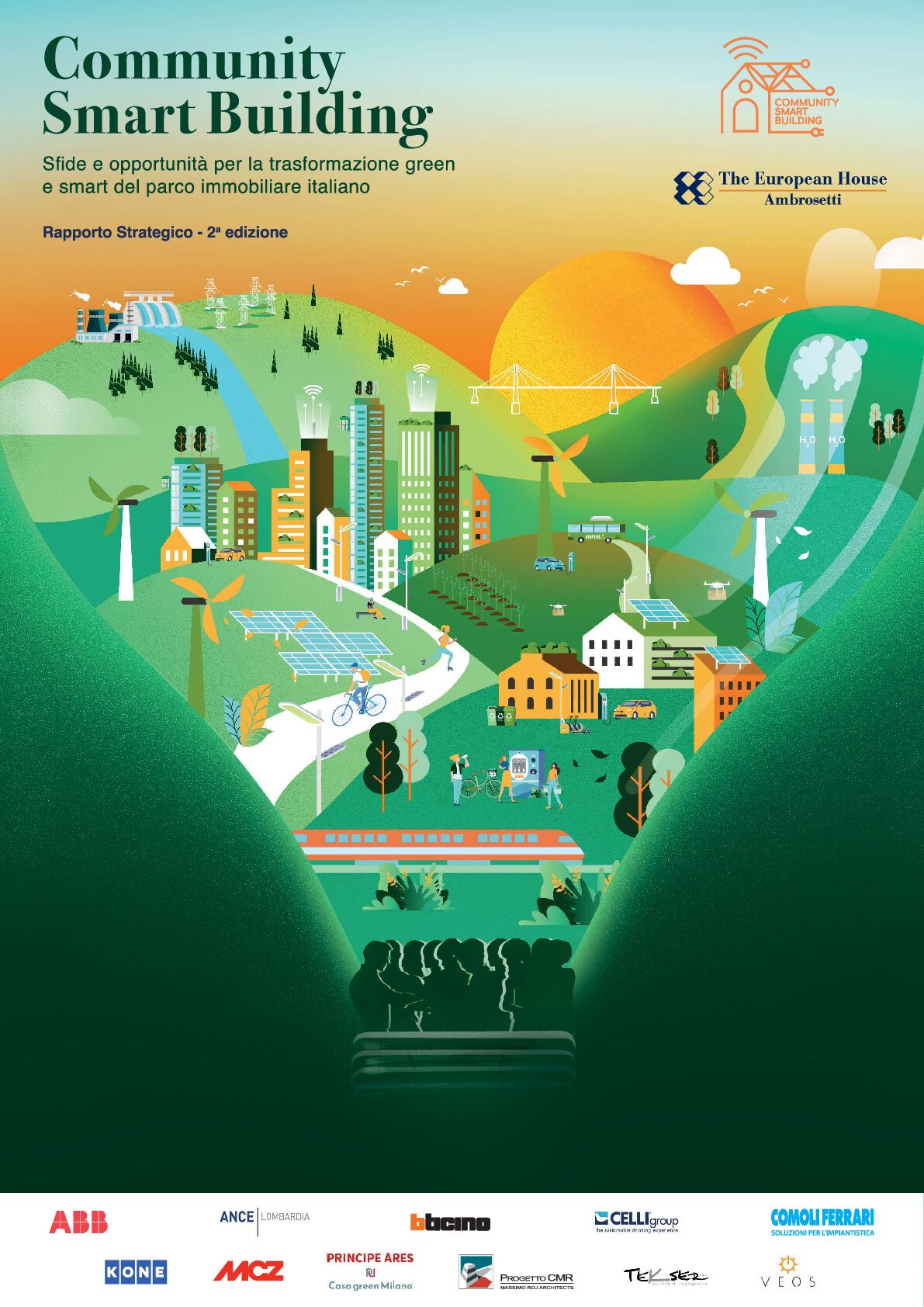Smart Building Community
A high-level platform for discussion, created to promote the "Smart Building" paradigm and foster dialogue and relations between the supply chain and the related institutional system.
The Community's objective is promoting the creation of knowledge on the most relevant issues in the smart transformation of Italian buildings, with an integrated strategic vision and a shared operating model, encouraging the development of proposals to promote the evolution of the Italian real estate as an opportunity for growth and modernization of the country.
The Smart Building's supply chain has a much higher economic and social weight for the country than it is perceived and is a fundamental asset for the competitiveness of Italy, with 130 billion euros of revenue generated, 40 billion euros of Value Added and over 620 thousand people employed.
The obsolescence of the Italian real estate urges a shift to the Smart Building paradigm: 72% of the buildings are more than 40 years old and are currently responsible for 45% of energy consumption and 18% of CO2 emissions.
The "Green Homes" EU Directive marks an important step forward for the efficient and sustainable transition of the housing stock, defining a series of measures to help European countries to improve structurally the buildings and promoting energy redevelopment, with particular attention to buildings belonging to lower energy classes. The new Directive requires each Member State to submit a National Plan for the energy upgrading of buildings, with the priority objective of reducing by 16% the primary energy consumption of the housing stock by 2030 and by 20-22% by 2035.
The Strategic Report of the Smart Building Community
Rome, May 7, 2024
The 2nd edition of the Smart Building Community, launched in July 2023, will end with a Forum aimed at presenting the results of the 2024 Strategic Report. The event will also be dedicated to discussing action proposals to support the smart transformation of the Italian real estate park and the growth and modernization of the country, with the leaders of the business community, key opinion leaders, and representatives of Italian and European institutions
Learn moreThe results of the Community's 2nd edition (2024)
The results of the Community's 1st edition (2023)
9 Smart Cities in Italy by 2030
The European Commission places Smart Cities among the pillars of the Horizon Europe Plan, and envisions the «smart development» of 9 Italian cities by 2030: Bergamo, Milan, Turin, Bologna, Florence, Prato, Padova, Parma, Rome. EU City Mission
Real Estate in Italy

72%
HOUSES BUILT
+40 YEARS AGO

47,1
€ BLN/YEAR IN THERMAL
AND ELECTRICAL CONSUMPTION

2
MLN ABANDONED HOUSES

0.85%
RENOVATED HOUSES/YEAR
(VS 1% IN THE EU)
Why is it important to talk about Smart Buildings today?
Renovations with low environmental impacts and high energy efficiency
Italy is still far from reaching the targets set at EU level for 2030 for greenhouse gas emissions (GHG), renewable energy penetration and energy efficiency, also due to the high obsolescence and low rate of building renovations.
The buildings sector is key for decarbonisation
Civil buildings are responsible for 45% of consumption and 18% of CO2 emissions in Italy - but only 21%of energy comes from renewable sources.
More remote workers
The COVID-19 pandemic has given way to the Society 5.0 paradigm, which revaluates the centrality of people's home and pushes the need to rethink the work spaces/ functions to ensure the well-being of the person and satisfy their new needs.
Investments in support of Made in Italy
Italy has a high expertise in the housing industrial and service supply chain. The National Plan of Resilience and Recovery (NPRR) and state incentives (e.g. Super Ecobonus, Super Sismabonus, House Bonus) open up opportunities for further development.
For every €100 invested in the construction sector, €58 are generated in the larger supply chain, taking into account their direct, indirect, and induced impact.
.jpg)
Lorenzo Tavazzi
Senior Partner; Head of Scenarios and Intelligence Practice; Member of the Board of TEHA Group
.jpg)
Benedetta Brioschi
Partner; Head of Food&Beverage and Sustainability Practice





















